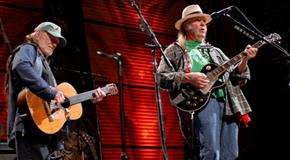Broken Toe Spurs Neil Young To Write 1st Book

No one should be surprised that reading his first book, the memoir “Waging Heavy Peace,” should feel exactly the same.
Young’s scatter-shot style includes a description of Crazy Horse as a living organism that illustrates an artistic sensibility better than any non-musician can, along with a recitation of a shopping trip he took once in Hawaii and praise for his electric toothbrush.
He generally avoids specific talk about songwriting. Yet he candidly admits that his song “Alabama,” a trigger for Lynyrd Skynyrd’s answer “Sweet Home Alabama,” was ill-advised. Young’s passions – his family, electric trains, cars and a system to sonically improve digital music files – get as much space as music.
“If you hang out with somebody, the conversation doesn’t always run out in a linear fashion, from A to B,” he said. “It’s what’s on their minds. Things happen. You see things out the window, you get interested in that. You get distracted by things. I always thought that was a natural way to go with it.”
Ultimately, a reader learns more about Young than they would if he had a ghostwriter’s help, a notion he practically snorts at in disdain. “That’s a scary damn idea,” he said, “having a ghost in the house.”

Some free time and a broken toe led the 66-year-old Rock and Roll Hall of Fame member into the project. It was in his blood. Young’s father, who died in 2005, was a well-known journalist and author in Canada. Young has always been a careful steward of his musical history and it’s little surprise he’d want to look back at his life in the same way.
“My whole M.O. for doing the book was that it was going to be off the top of my head,” he said. “I wasn’t going to spend any time trying to organize anything. That’s always worked for me with everything else I’ve done.”
He also wrote with a clear head, swearing off alcohol and marijuana, the latter due to a doctor’s advice and fear that continued use could lead him into dementia, which his father suffered from.
That was no easy decision. Young said he wrote virtually all of his songs while high and wondered if he could without the crutch. His songwriting dry spell lasted more than a year before he started again, and he’s set to release the new two-CD set Psychedelic Pill on Oct. 30 that includes some epic jams with Crazy Horse.
Young writes movingly about his family and with admiration for son Ben, who is afflicted with severe cerebral palsy. There’s a heavy sense of loss, too, for old friends who died like Danny Whitten of Crazy Horse and David Briggs, his record producer. He was clearly rocked when Kurt Cobain’s suicide note quoted Young’s lyric, “It’s better to burn out than to fade away.”
The book is not for gossips. Look elsewhere to find out who slept with who or who’s feuding. Some of his direct celebrity references are mundane (Linda Ronstadt’s fondness for peanut butter), although he couldn’t resist a joke about David Crosby’s advanced chemical collection.
“I just don’t care about it at all,” Young said. “Tell all? Tell what? … I don’t like to read it and I don’t like to write about it.”
Some celebrity references are oddly oblique, like a paragraph about “my friend Paul.”
“Paul and I are friends because we both knew and loved Linda, who I met first during Buffalo Springfield days,” he wrote. “Linda was a wonderful girl and lady. Today we are in touch periodically and talk about music or whatever. I like Paul a lot.”
Wait a minute. Would that be McCartney? (Yes). Does that mean Linda McCartney, whose photo of Young is on the book’s back cover, had a pre-Paul romance with Neil? (No).
His editor would occasionally probe Young to reveal more details. Often he’d just say no.
Young said he doesn’t read reviews of his music, but he did sneak some peeks at book reviews. They’re mixed: Entertainment Weekly called it a “jumbled, slightly surreal narrative that struggles with momentum.” The Wall Street Journal called it terrific, “modest, honest, funny and frequently moving.”
Young has already written part of a sequel, which he said started out to be about cars and dogs but now is largely about record players. He’s not leaving music behind, though. There’s a tour with Crazy Horse this fall.

“When music is finished with me, I’ll be OK,” he said. “Right now I still do it because it seems natural. If it ever comes to the point where I can’t do it justice, when I’m not doing my best, then I’ll stop.”
 Daily Pulse
Subscribe
Daily Pulse
Subscribe

